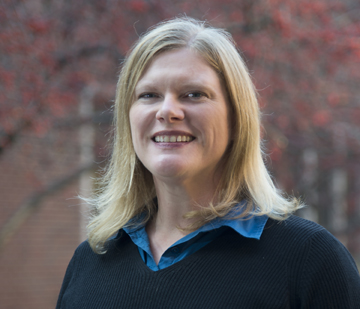Purdue Profiles: Jane Yatcilla
November 27, 2012
 |
|
Jane
Yatcilla, life and health sciences information specialist and associate professor
of library science. (Purdue University photo/Mark Simons) |
Jane Yatcilla always wanted a career working with technology and people -- and she found just that at Purdue Libraries.
Yatcilla is a life and health sciences information specialist and an associate professor of library science, and her job involves elements of elegant simplicity and others of intense complexity.
Yatcilla’s work with Purdue's IMPACT initiative has improved the College of Science course she co-teaches. Additionally, through Purdue's Human-Animal Bond Research Initiative (HABRI) Central project, she creates a controlled vocabulary to define the scope of research about the human-animal bond.
What is the HABRI Central project, and how are you involved?
The HABRI Central project is a joint venture among the College of Veterinary Medicine, Purdue University Libraries and Purdue University Press. It's funded through the HABRI Foundation, which is a nonprofit based in Washington, D.C. The project began in 2011, and its goal is to create an online, cooperative environment for researchers studying the human-animal bond.
My job is to create a controlled vocabulary of the terminology used in this field, so that the research indexed or published on the site is more findable and therefore more accessible to users. Essentially, I'm analyzing research literature from a variety of databases -- including those involving agriculture, medicine, psychology and sociology -- to determine how the field's vocabulary can be standardized most efficiently for our purposes. It's a huge undertaking; our bibliographer, Gretchen Stephens, already has uploaded more than 12,000 publications, and that represents just a fraction of the search strategies she’s planned. There's a lot of vocabulary in that literature, and researchers from different disciplines use different terminology.
What is the name of the class you teach?
I co-teach a course called SCI 360, or Great Issues in Science and Society, with computer science professor Buster Dunsmore. The course exposes College of Science majors to the social, economic and political aspects of various scientific problems.
For example, if a magical solution to climate change were found today, it’s unlikely that all stakeholders would harmoniously band together to implement it and watch the problem go away. There would probably be policy and market forces, unrelated to the actual science, that would have to be dealt with before that could be accomplished. Our class exposes students to these types of hurdles so they can understand how these factors might affect their future work as scientists and citizens.
How have you worked with IMPACT to improve the class?
Since the spring, I've worked with IMPACT (Instruction Matters: Purdue Academic Course Transformation) as a member of its support team, along with other librarians, staff from ITaP and staff from the Center for Instructional Excellence (CIE). The support team assists IMPACT fellows in choosing and implementing a redesign model for their course.
As a result of my exposure to various pedagogical models and techniques learned through IMPACT, I revamped the method through which SCI 360 students were placed into teams, and I implemented a peer assessment component that has the ability to affect students' grades by boosting or lowering the points students earn through team activities. That assessment has led to some really great insights from students about their team members, and about their overall environment when working on team projects. Some students have commented that for the first time they've actually enjoyed team work.
What interested you in a career as a librarian?
I saw a career as a librarian as something that would involve both social interaction and technology, and to me that was very appealing. So, shortly after getting my bachelor's degree in mathematics and philosophy from the University of Pittsburgh, I decided to earn a master's degree in library science.
As a librarian, one of the great things about my job is that I get to work on a variety of topics and projects, but I also get to meet a lot of people. And now that I've added a teaching component to my career, I've learned that I really love that, too. It's an uncommon opportunity for librarians to teach a three-credit course, and I really value my time with my students.
It's very rewarding for me to work on projects such as HABRI Central, which helps researchers in a technological way, while teaching the next generation of scientists and explorers. That combination of technology and people makes my career is very gratifying. I wouldn't trade it for anything.
Writer: Amanda Hamon, 49-61325, ahamon@purdue.edu

